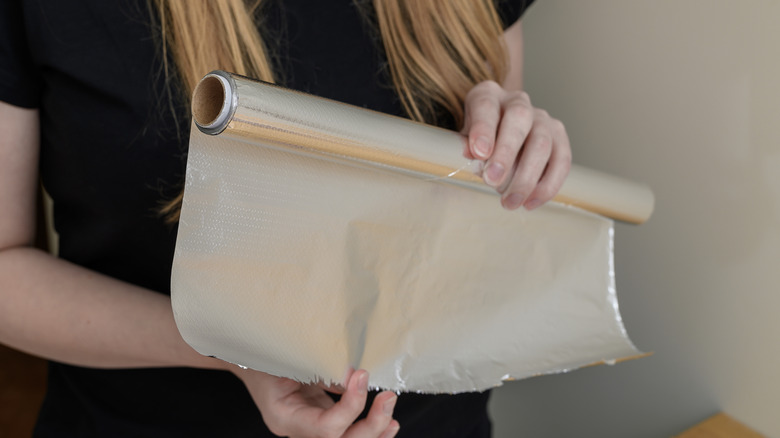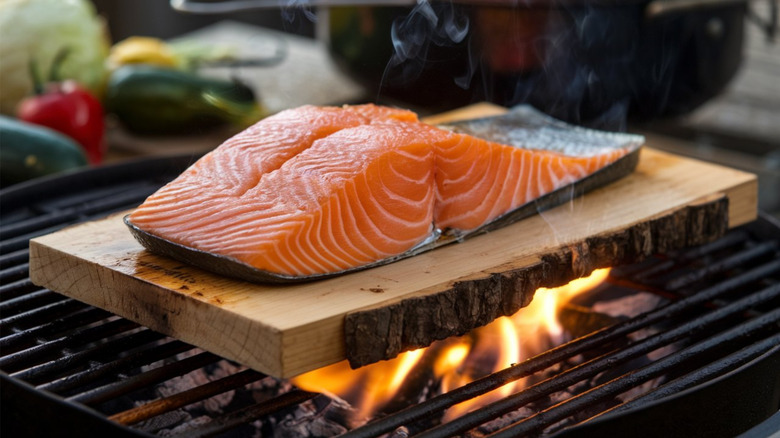Think Twice Before Grilling With Aluminum Foil Again
Some people absolutely swear by aluminum foil when it comes to grilling. Whether they are using it to get veggies to that perfect temperature or giving fish and ribs that smoky taste, foil has long been a useful tool for barbecuers everywhere. However, it might be time to step back from the foil for the sake of your health.
Some scientific studies have suggested that tin foil can leach high aluminum levels into your food, thereby raising levels in your body as well. Depending on what was cooked, the increase could be shocking. A 2006 study (via the National Library of Medicine) found that when cooking red meat, such as steak or ribs, the foil raised aluminum content by 89% to 378%! This suggests that grilling with aluminum foil can dose our bodies with more aluminum than we can safely absorb or expel. Foods with high acid or salt content seem to cause more aluminum seepage in general, meaning that meat and veggies marinated in citrus or with a salty dry rub could be particularly problematic when grilled in tin foil.
Aluminum foil isn't always a problem
While this is alarming, aluminum foil is only potentially concerning under certain conditions. Cooking on high heat of over 400 degrees Fahrenheit, such as with open flames, pushes foil to the point of possible toxicity. The heat causes microscopic flakes and cracks in the foil's surface, making it more likely to get into food. It can happen not just when grilling, but when frying or baking as well. Using tin foil when baking is a mistake for another reason — your goods may not heat evenly, besides possibly having a metallic taste. In these instances, you may want to go foil-free. However, short-term storage of low-acid food in tin foil appears to be fine. You can freeze or refrigerate tin foil without worry, since heat seems to be the big factor.
It's also worth noting that research on the effects of increased aluminum in the human body is still ongoing. While elevated aluminum levels have been found in the brains of people with Alzheimer's disease, there are no conclusive studies as to whether the increase is from food, medication, or other genetic and environmental factors. While there is also an observed correlation between high aluminum intake and increased inflammatory bowel disease, definitive proof has not yet been found. A 2019 study by Food Science & Nutrition (via the National Library of Medicine) suggests that high aluminum levels could be more problematic for children and those with certain health conditions, but healthy adults may not be as much at risk. Levels of less than 2 milligrams for every 2.2 pounds a person weighs should not be harmful.
Alternatives to aluminum foil
If you do decide to ditch the foil, there are still ways to get some top-notch grilled food without aluminum. For baking or cooking veggies, stick to metal cooking sheets that transfer heat more evenly and don't add a metallic flavor. When grilling meat, there are stainless steel grill baskets that you can use on open flames that act similarly to foil packets. If you're feeling particularly daring, you could even try your hand at plank grilling. This involves putting meat or veggies on a water-soaked cedar wood plank placed directly on the grill's surface to get a smoky, flavorful result. Beyond these options, you could try grilling in cast iron or steel pans you already own.
All of these are reusable and sustainable alternatives that still let you grill it up to your heart's content without potentially unrecyclable foil. Aluminum foil isn't great for the environment, so cutting it out of your grilling tradition can help reduce waste. If you're worried you won't know what to do with all your leftover foil, keep in mind that tin foil has many uses outside of cooking.


